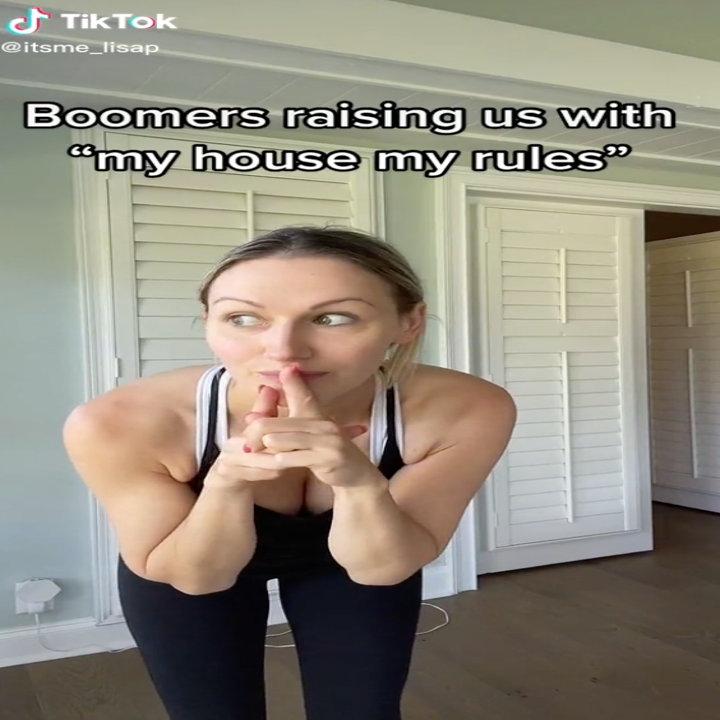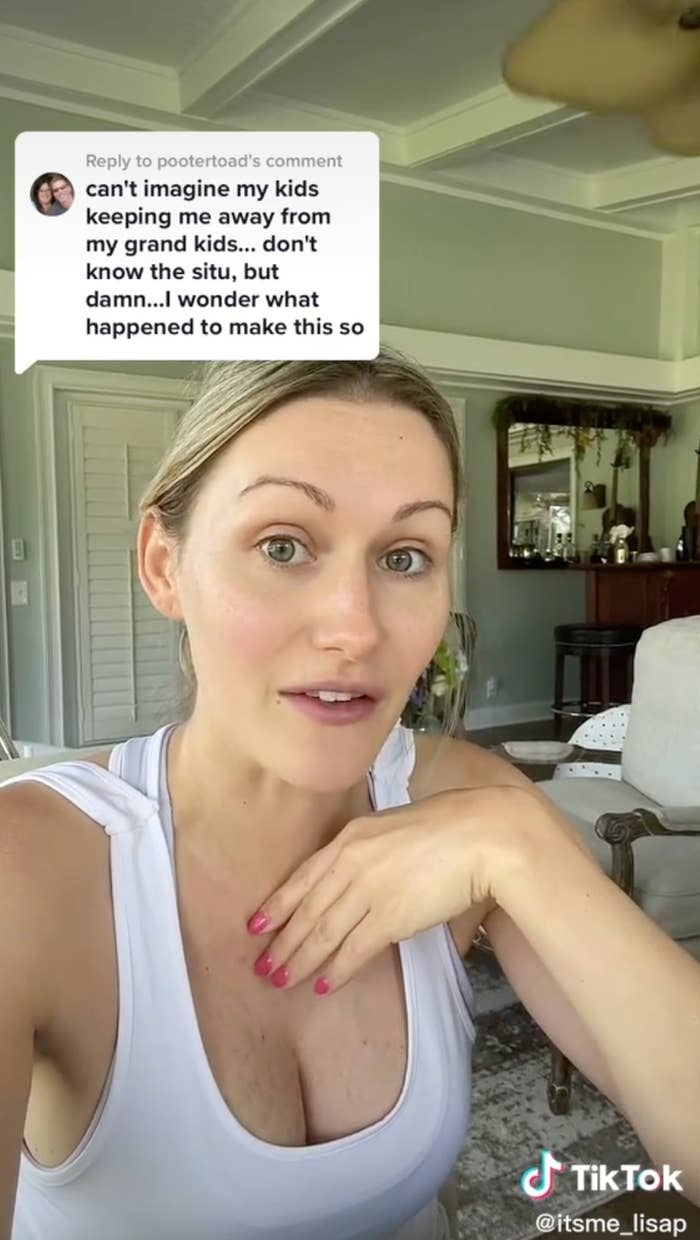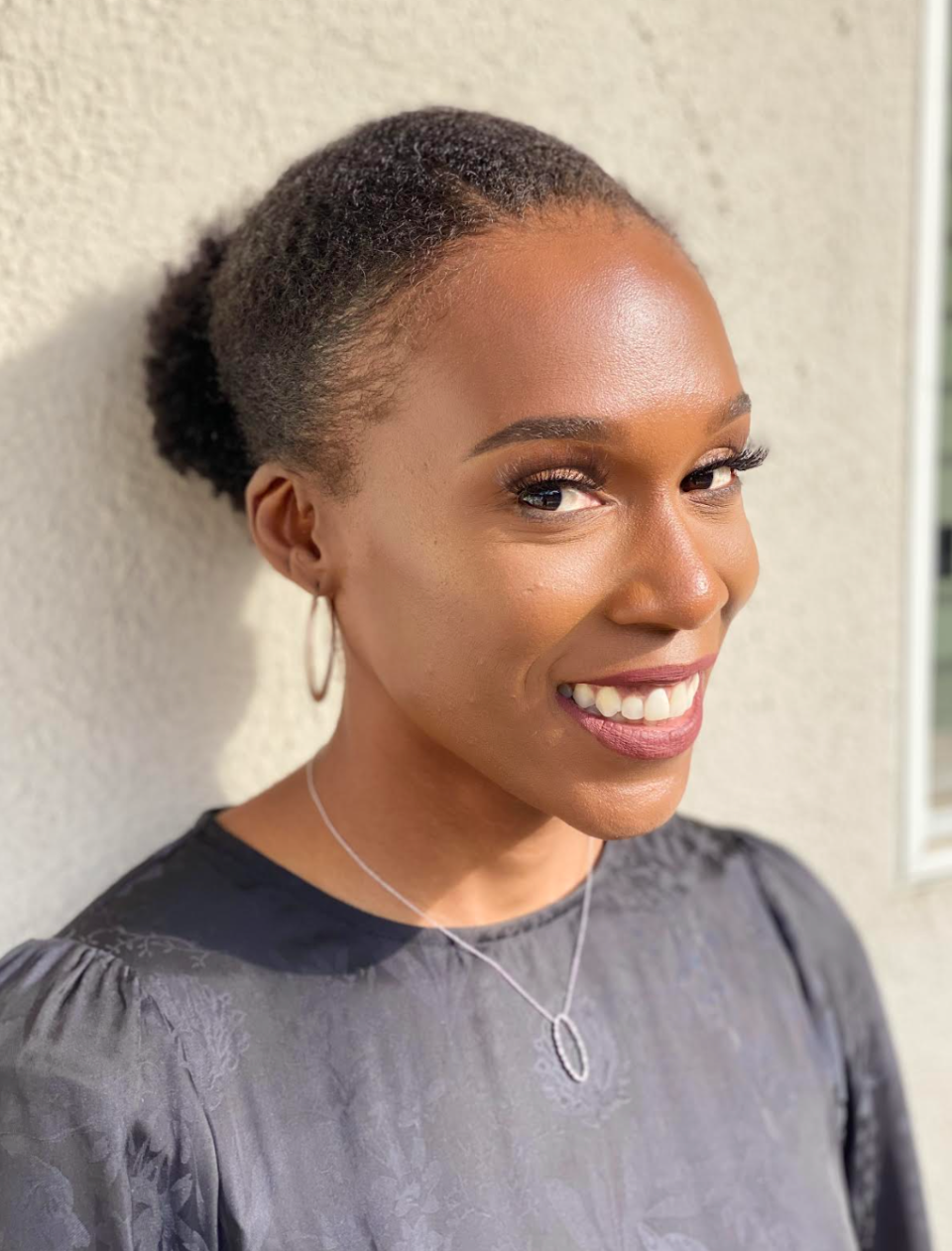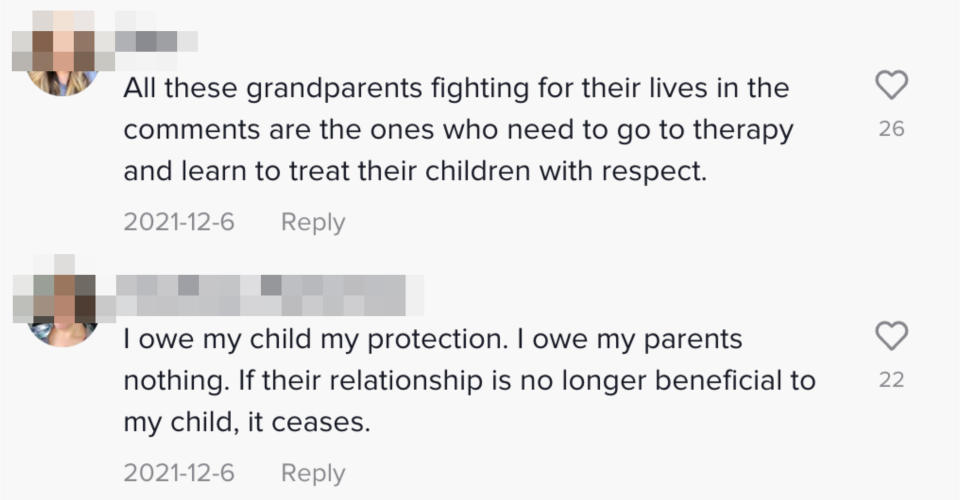Moms Are Calling Out "Boomer" Grandparents Who Overstep Their Boundaries And How Toxic The Whole Dynamic Is
A quick TikTok search of "grandparent boundaries" will pull up all sorts of parents calling out their in-laws or their own parents who overstep their boundaries with their kids – and how detrimental it has been for their relationship.

Lisa Pontius is a mom of three and TikToker who isn't afraid to speak her mind when it comes to boundaries. In fact, we spoke to Lisa about her view on how kids don't owe their parents anything earlier this year. Now Lisa is siding with other parents who believe in the importance of setting grandparent boundaries.
In one of her viral TikToks, she said, "In case no one told you, having boundaries is not the same as keeping your kids away from your parents. That's a whole different relationship dynamic – one that I don't have. My parents see my kids. My parents see my kids actually kind of a lot; they live pretty close to us. I still have boundaries with my parents in regard to my children. They still have boundaries with me over when and how often and how much they're going to watch said grandchildren. We each acknowledge and respect each other's boundaries. That's how you have a mutually respectful, adult relationship."

"Boundaries isn't a threat. Boundaries isn't a dirty word. Every adult relationship has boundaries – scratch that – every relationship deserves boundaries, even ones between adults and children. My parents get to see my kids because they respect my boundaries. But if someone does get cut off from their grandchildren, it's a pretty good indicator that they didn't respect the parent's boundaries to begin with!"
BuzzFeed spoke to Lisa who has been able to successfully navigate grandparent boundaries and is sharing what has worked for her to help others. "I have always been interested in interpersonal relationships and family structures. I was an anthropology major in college and just always found observing these things fascinating. When I started sharing my life on social media, I included a lot of commentary on motherhood – including the very common struggle with navigating in-law relationships as a new mom."
Lisa believes the whole parent/grandparent relationship should be based on respect for one another. If the grandparent is trying to act like the parent of the grandchildren, Lisa said it can be extremely frustrating, especially for a parent who is trying to establish authority and rules with their child. "Being undermined by a third party (even if it’s a seemingly well-intentioned grandparent) can cause a lot of strife. The parent ends up feeling completely disrespected. The parent needs to let it be known in a direct way that their parenting decisions are to be respected and honored if the grandparents want to participate."
Boundaries can be small things, like telling the grandparent to call before they come over or asking them not to give your child sweets, according to Lisa. "Boundaries don’t have to be big or start a fight necessarily. Most boundaries I’ve set with my in-laws have been small things like that. Some have been bigger and needed larger conversations. The word 'boundaries' scares a lot of people, they can be seen as threatening, but in reality, they serve to protect a relationship. Boundaries are a way to navigate these relationships in a way that resentments don’t build," she said.
And therapist – and mom – Princess Audia Reggie, AMFT has also been candid about grandparent boundaries on TikTok, backing parents who are speaking out. "This is a message to all the entitled grandparents out there: Having a relationship with your grandchildren is a privilege. It is not a right," she stated in one of her TikToks.

"You have no rights in the United States of America* to your grandchildren. OK? Very likely, the proximity to which you have with your grandchildren reflects the relationship and the type of dynamic you have with your adult children. So if you love, care for, miss, and cherish developing or maintaining or cultivating a relationship with your grandchildren, you may want to start with the source: their parents, your children. And determine the ways in which you and your behavior may or may not dictate how close they want you with their kids," she concluded in her TikTok.
*There are certain situations where a grandparent can petition for visitation or custody of their grandchildren. But, in the US in general, the law protects parental rights. This means that grandparents' visitation is not mandatory because, under their parental rights, parents are solely able to decide what is best for their child.
Princess holds a master’s degree in clinical psychology, marital, and family therapy. "I am a mental health therapist whose clinical specialty is intergenerational trauma and parenting. I am passionate about helping my clients identify and disrupt unhealthy patterns of behavior and communication that are often passed from parent to child through unhealthy parenting practices. In my clinical practice, I emphasize the importance of learning new skills to cope with a variety of mental health issues," she told BuzzFeed.

Princess said grandparents and extended family members should treat their relationship with their grandchildren and nieces/nephews as a privilege rather than a right. "This will help to reduce harmful behavior brought on by a sense of entitlement such as ignoring or overstepping boundaries of the primary caregivers," she said.

"In a home where the primary caregivers are safe, loving, competent, and present, there is no need for grandparents to overstep their authority and take on the role of the primary caregiver. Instead, the grandparents can become part of a healthy and vital support system for their adult children in the form of respite, caregiving, financial, emotional, and physical support. Primary caregivers should be supported and empowered by grandparents to make decisions that they believe are best for their children, and grandparents should do their best to adhere to the parenting style and parenting plan of the primary caregivers."
Princess said communication of your parental boundaries is key. "Boundaries operate best in three ways. The first is to articulate the boundary out loud to others. It’s a mistake to assume people can read your mind, so be sure to speak your boundaries out loud. Second, all boundaries must have consequences. Before speaking about your boundaries out loud, have a conversation with yourself and others, such as your partner, about what the consequences for overstepped boundaries will be. This must be a collaborative effort because it will require that you and your partner are on board with the consequences as well. And third, when boundaries are overstepped or ignored, the consequences need to be put into action by the primary caregivers."

"For many, following through with consequences when boundaries are overstepped is the most difficult part because the family system of either primary caregiver did not support articulating and asserting boundaries in childhood. Essentially, the interactions that adult children have with their parents and in-laws mirror those they had when they were children. This comes down to the tools and support parents have at hand to break generational patterns that are in the best interest of their children. Many clients that I work with are the only individuals in their family of origin who have attempted to break generational patterns. They often express how difficult and lonely the road is. To all those parents, I encourage you to keep going."
It’s also important to examine what cultural differences there may be. "A few examples of cultural differences are the way and what we eat, how and what language we speak, and how we dress. Cultural differences are not that we have passed on generational patterns of physical, emotional, and/or verbal abuse perpetrated against children. Unfortunately, for far too many people, abusive parenting practices have been normalized and accepted as 'cultural differences' when this is not the case," Princess explained.

"What many have been socialized to believe are 'cultural differences' in parenting practices are [actually] unhealthy and abusive patterns of behavior and communication that are passed from one generation to the next through parenting practices. Two examples of this are spanking and emotional neglect. A few ways to address abusive generational patterns are through therapy, parenting education, improving communication skills, and implementing healthy boundaries. Therapy is a great tool to explore when parenting because it can help you identify unhealthy patterns of behavior and communication that were normalized, tools to help cope with parenting-related stressors, and to identify triggers brought on by parenting experiences and challenges."
For parents who specifically struggle with in-laws trying to parent the way they would instead of how the parent asks them to, Princess said this is challenging to navigate. "This scenario is very common, and it is crucial that the parent sit down with their partner and have a conversation about how they will directly address this issue with the in-laws. Conflicts like this with in-laws can easily turn into conflicts between primary caregivers that can have a negative impact on the relationship. It is important to move as a united front when child-rearing-related conflicts with in-laws arise."

"I also find that adult children struggle with how to communicate effectively when there is a conflict. This very often arises because there are unspoken rules in place in family systems that you grew up in, married into, or are impacted by as a result of having a child with a person. These rules are also called family scripts where each family member plays out their role in the family system without any conscious awareness.
Another way to address this is through education. How can we expect our in-laws to utilize a different set of parenting skills if they never learned what to do differently and why the parenting practices they implemented are harmful? In cases where in-laws are open-minded and willing to listen, educate them on the ways in which they can parent differently. Teach them some of the tools that you use with your children. And use negative experiences as teachable moments for active and open grandparents."